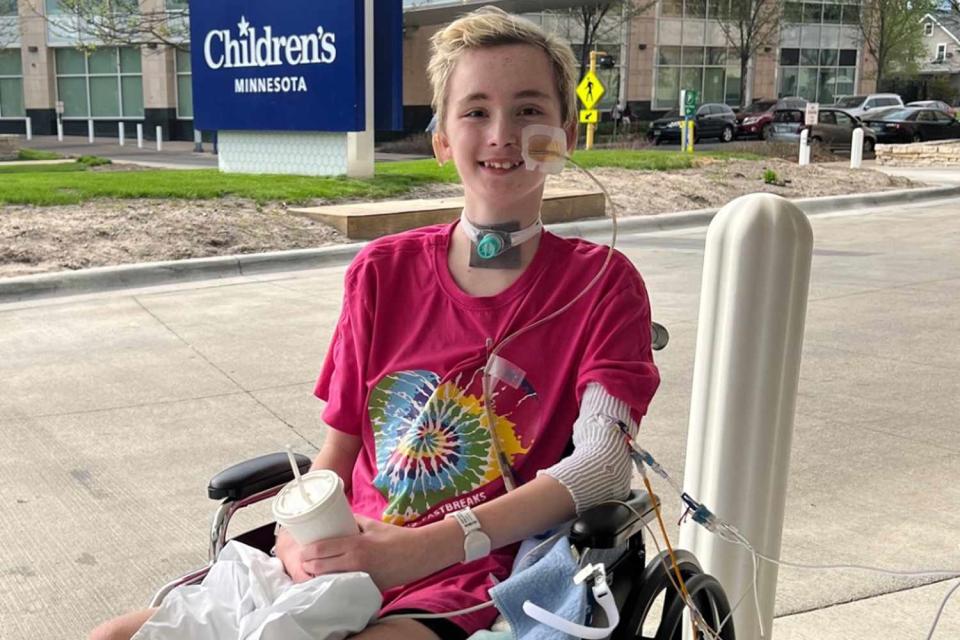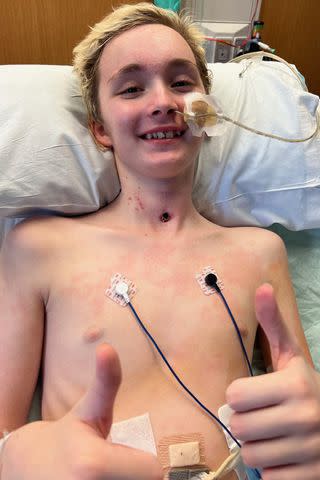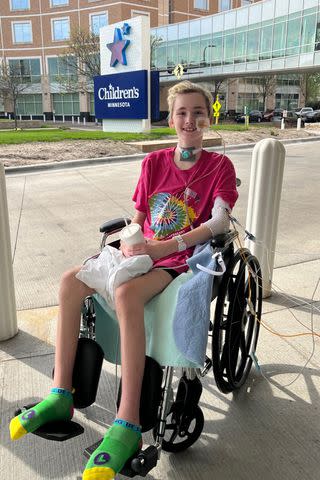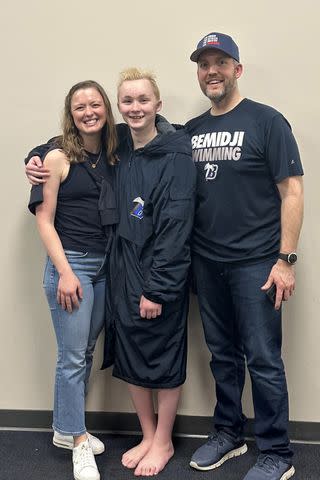Teen Becomes Temporarily Paralyzed After 2 Insect Bites: 'Something Was Very Wrong'
After being infected by a virus that caused his body to attack itself, Kellen Knutson was partially paralyzed but has since made a "remarkable recovery"

Knutson Family
Kellen Knutson in wheelchair outside of hospital.Kellen Knutson developed a serious illness that landed him in the hospital for two months where he lost 30 lbs.
He was diagnosed with acute flaccis myelitis, a polio-like illness that affects nerves in the spinal cord
The condition, which occurred after 2 insect bites, caused paralysis from which he is still recovering
Last March, Kellen Knutson stayed home from school with what his parents assumed was an ordinary cold. But when he became more ill over the next week, his family grew concerned. By Saturday, the seventh-grader from Bimidji, Minn., couldn’t stop throwing up. He seemed loopy and had trouble walking to the bathroom.
“Something was very wrong,” says his mother, Heather Knutson, an oncology dietician at the Leukemia and Lymphoma Society. “Everything was getting worse. We knew something was bad.”
On April 1, 2023, his parents took him to the ER where he was given fluids and anti-nausea medication before being sent home. Two days later, he was back at the hospital, unable to urinate on his own.
“It was painful,” Kellen, now 14, remembers. His parents were told that urine retention can be a rare side effect of the nausea medication. His bladder was drained and he was sent home again this time with a catheter.
Alarmed, his parents reached out to doctors and medical professionals in their family. "We were calling our resources saying, 'We don't just want to go to the ER and be sent home again,'" his mom says.
By this point, Kellen could no longer stand, his eyes were rolling back in his head, and he couldn't hold a conversation, says his father Philip, who works for a non-profit. He couldn't support his neck and was vomiting a dark stomach bile.
On April 5, Kellen's parents had to use an office chair to roll him to the car so he could see a new pediatrician. She ran a few tests, then ordered a spinal tap.
"I have no memory of any of this," Kellen says.

Knutson Family
Kellen Knutson in hospital bed.
It was determined that he needed more serious care, so he was transported 220 miles to Children's Minnesota — in a snowstorm — where he was admitted to the pediatric ICU.
"It took weeks for us to start getting answers," his mother says. "It felt like every day, or every couple days, they were coming in and ordering different tests."
Kellen was given high-dose steroids and combinations of different antibiotics and he underwent round after round of special procedures as doctors searched for answers. He was sedated for about three weeks; during that time he lost about 30 lbs. and had more than a dozen machines attached to his body.
"As a parent, there were times in those first weeks when it crossed my mind, 'Is it better if he passes away?' Because it was a real struggle," Philip admits. "It was near death and it was hard to watch his body struggle to that extent. He was just skin and bones."
After about four weeks, Kellen was given a presumed diagnosis of Acute Flaccid Myelitis (AFM), which is a rare, polio-like neurological disorder that affects the nerve cells in the gray matter of the spinal cord.
A four-hour MRI confirmed the diagnosis.
"We could see the whole spinal cord, and the brain stem through the end was inflamed," his mother says. "It was impacting all of the nerves through his whole body."
Doctors weren't sure which nerves were reconnecting, she says. "At one point we were told he will probably be in a wheelchair and may have challenges breathing."
It was a devastating diagnosis, Philip says.
"It started making us work forward in planning what life was going to be like — we were assuming part of him would be paralyzed, maybe forever, we weren't sure, he says. "If he needs to get around in a different way, we'll figure that out."
Before his health scare, Kellen had been a straight-A student who competed in triathlons. He was on the varsity swim team at his middle school and enjoyed robotics and sitcoms. Now, his parents were decorating his hospital room with quotes from Parks & Rec, The Office and Ted Lasso.
Two days after the MRI, a different neurologist told them that even with bad swelling, there can sometimes be a good outcome. "That was a little bit of hope," Phillip says.
And then, in mid- to late April, Kellen wiggled one toe. This was very encouraging — it meant he still had the ability to move.
Over the next few months, Kellen worked tirelessly with his occupational, physical and speech therapists to re-learn how to walk, talk and write. A GoFundMe was established to help with costs.
"He is one of the most motivated and strongest kids I’ve ever met,” says Jeanna Sommer, Kellen’s occupational therapist at Children’s Minnesota. “Frequently during our rehab we had to remind Kellen to take breaks. He worked hard every single day.”
He even did his exercises, everything from squeezing a stress ball to raising his arms above his head, while he was sitting in the bed with nothing else to do.
“Anything I could strengthen at the time was one more thing I could do when I was just sitting there all the time,” Kellen says, of why he continued to push himself.
Related: Woman Left Unable to Walk After Mosquito Bite Led to West Nile Virus
Kellen set a goal to get up out of his wheelchair when he left Children's Minnesota on May 23. And he achieved it.
“Typically, with that diagnosis, often a complete recovery is not anticipated,” says Mackenzie Dwyer, Kellen’s physical therapist at Children’s Minnesota. “For him to go from needing 100 percent help to just sit up in bed, to needing very minimal assistance to stand up from a wheelchair by the time that he leaves is quite remarkable.”
Kellen was transferred to an in-patient rehabilitation center until June 30. This time, he decided that when he left he wanted to be able to actually walk to the car. While he had mostly been using crutches, on the day he was discharged, "he walked five or six steps without his crutches to the car," his dad says.
Never miss a story — sign up for PEOPLE's free daily newsletter to stay up-to-date on the best of what PEOPLE has to offer, from juicy celebrity news to compelling human interest stories.

Knutson Family
Kellen Knutson in a wheelchair outside on the hospital.Related: Louisiana Teen Diagnosed with Rare Cancer in His Testicle: 'Something Wasn't Right' (Exclusive)
While there is no way to know exactly how Kellen contracted AFM, he did test positive for two different rare viruses: Powassan, a tick-borne virus and Jamestown Canyon Virus, carried by mosquitos.
"Both or one could have been the culprit in triggering this condition," his mother says. While AFM is known to be transmitted by mosquitos, doctors can't say for sure that this is what caused Kellen's condition.
His parents learned that both of the bugs that carry these viruses are present in their town after the snow melts.
But none of that mattered to Kellen. “I was like, 'I'm alive! Anything here is a bonus,'” he says.
In fall 2024, Kellen returned to school in crutches and a wheelchair. At first, he had to use leg braces, but eventually he could walk on his own.
He also rejoined the swim team. Before before the illness, he had specialized in the butterfly and endurance races but, this past winter season from November 2023 until February 2024. He swam a 50-meter butterfly in a medley and a 100-meter backstroke.
"That was new for me," he says. “I'm doing good, it's pretty much back to normal, better than I would've expected. I'm walking good. I was able to swim the entire swim season.” He even competed in the sectionals tournament.

Knutson Family
Kellen Knutson standing besides his family.Related: 4-Year-Old's Heart Stopped Beating for 14 Hours, Then ‘Restarted’: ‘Incredible Thing That Occurred’
He still has bi-weekly physical therapy to regain strength and muscle but he feels great about his progress.
“My whole outlook has changed,” Kellen says. “It's affected me, it's changed my mindset a little bit. You don't know what others are going through. It's easy to take things for granted."
His parents agree and say they spend more time together as a family, including Kellen's 10-year-old sibling. Recently they all went to New York to see Hamilton on Broadway. They also love playing board games together.
“We had times that we were mad or frustrated,” Heather says. “But Kellen has never once complained or gotten mad about his situation. We've learned a lot about him: He has a lot of grit. He's very comfortable being uncomfortable and he can work hard. And he has handled this more gracefully than we have as adults.”
For more People news, make sure to sign up for our newsletter!
Read the original article on People.


